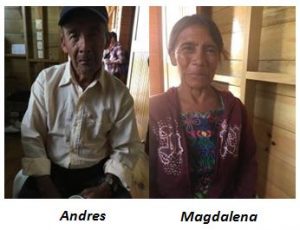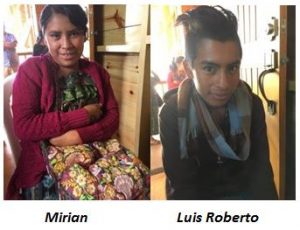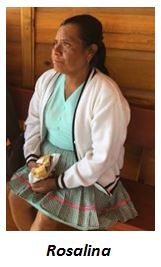Screening in Guatemala: A Firsthand Account of the Daily Lives of Coffee Farmers
 Each morning, thousands of Guatemalan farmers wake up long before the sun has started to rise to make the three-hour trek to coffee plantations outside the city of Antigua. Many are mothers with their young children swaddled in aguayo (a woven blanket used to carry items) strapped to their backs. They slip on their plastic chinelas (flip-flops), fill their recycled Coca-Cola bottles with water from their shallow well and begin the long, familiar hike down the dark dirt road. The farmers know this journey well: many first started down this same path when they were on their own mothers’ backs. Days on the farm stretch until the sun is ready to set, and the workers make the same hike back home in the evening. They are lucky to catch six hours of sleep before it is time to do it again.
Each morning, thousands of Guatemalan farmers wake up long before the sun has started to rise to make the three-hour trek to coffee plantations outside the city of Antigua. Many are mothers with their young children swaddled in aguayo (a woven blanket used to carry items) strapped to their backs. They slip on their plastic chinelas (flip-flops), fill their recycled Coca-Cola bottles with water from their shallow well and begin the long, familiar hike down the dark dirt road. The farmers know this journey well: many first started down this same path when they were on their own mothers’ backs. Days on the farm stretch until the sun is ready to set, and the workers make the same hike back home in the evening. They are lucky to catch six hours of sleep before it is time to do it again.
In the fields, the farmers work relentlessly, rarely taking a break as they can earn 50 quetzales (roughly $6.50) in a day if they can pick 100 pounds of coffee – a nearly impossible task. They turn to their children to help meet their quota. The children pitch in eagerly, not knowing that most of them will continue working in the fields until eventually their callused, crippled hands have grown too old to do the work.
Bridge of Life (BOL) had the opportunity to spend three days at Bella Vista Farms to host a kidney disease screening for 811 coffee workers. We tested blood pressure, urine and blood. We held health education workshops for the farmers to better understand their health results and learn the causes behind some of their poor health conditions and how to improve related behavior. Patients at risk saw a nephrologist and received any necessary medication for free. We learned that the farmers’ work takes a toll on their health. Hypertension, likely caused from stress, is a reality for far too many. Many of the farmers also suffered from diabetes. Health issues are ignored, or perhaps they just never recognized the wa rning signs.
rning signs.
Several of the farmers shared their personal lives and stories with us:
Andres is 75 years old and doesn’t know any life other than one working in the fields.
Magdalena still picks coffee at 62 years old. She can’t quite remember when she started, but is certain that it’s been more than 50 years.
Mirian is 24 years old. She attended school only through the third grade. She has two children. She makes the three-hour hike to work with her youngest tied to her back and her oldest on her hip. While she works, the two children play under the shade of the coffee trees. She wants another life for her children, but admits that her toddler already knows how to pick and has started to help her in the fields.
 Luis Roberto is a stylish 18-year-old young man. He started working full time on the plantation at 13. “I left school for my family,” he said. “That’s what we all have to do for our families.”
Luis Roberto is a stylish 18-year-old young man. He started working full time on the plantation at 13. “I left school for my family,” he said. “That’s what we all have to do for our families.”
These farmers’ situations are not isolated cases. Their stories are similar – ones that are replicated and re-played among generations of farmers, where young children are willing to put their own dreams aside to help their mamá or papa meet their 100-pound quota and the cycle of poverty continues. People never start or drop out of school to find a job in agriculture.
The level of poverty the farmers experience became very evident when I asked Fidelia, a 30-year-old woman, if she has access to clean water at work. She responded very nonchalantly: “We can get water to drink at work when rain falls from the sky. Otherwise, we have to bring it from home.”
Our team also saw firsthand the consequences of illness that went undetected for far too long…
Rosalina is 53 years old. Despite the fact that her mother is diabetic and her father is hypertensive, she rarely thinks about her own health. A day without work means a day without food, and so Rosalina, like most of the other farmers, ignored the warning signs. The weeks before we arrived in Antigua, Rosalina’s health took a turn for the worse. She started vomiting and feeling dizzy and fatigued. Her vision blurred. Still, Rosalina went to work each day. After screening Rosalina, we learned that she was living with Stage 5 kidney disease and didn’t know it. Our team counseled Rosalina about her health and sent her in an ambulance to Guatemala City to get the healthcare services she needed. In this case, our screening program was not just a matter of prevention – it offered lifesaving treatment.
Currently, there is no identified cause of chronic kidney disease (CKD) among agricultural workers. Unlike normal cases of CKD, CKDu (chronic kidney disease of undetermined causes) has a rapid onset with proteinuria and albumin (usually early indicators of kidney disease) noticeably absent until later stages of the disease. Many speculate that it is caused by heat stress, dehydration or pesticides. Perhaps it’s the combination that creates the perfect storm.
What is for certain is that this new form of CKD needs continued research. The farmers already face so many challenges and, for most, treatment is out of reach. BOL is committed to working alongside these farmers to understand the causes of and solutions to this fatal disease. The road may be muddy and long…but we will get there!
COMING SOON! Stay tuned for our next chapter in this blog series …
True Life: I Work on a Coffee Farm, by Jesse Casco, Patient Care Technician, DaVita Kidney Care
Find the link on BOL’s Facebook page